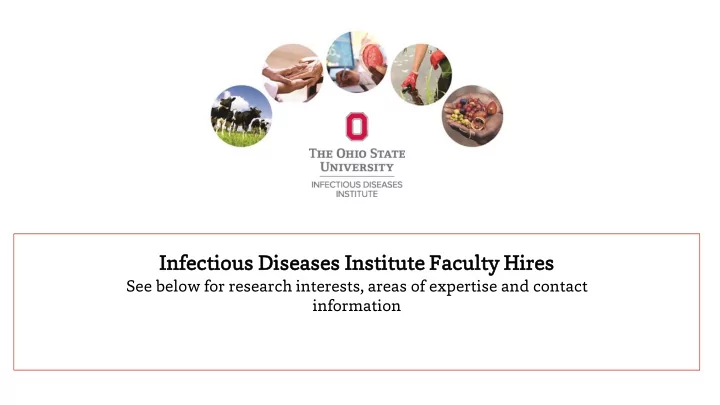

Infectious Diseases Institute Faculty Hires See below for research interests, areas of expertise and contact information
Matt Anderson, Ph.D. Anderson.3196@osu.edu Microbial Communities, Host Defense and Microbiology College of Arts and Sciences, Dept. of Microbiology; College of Medicine, Dept. of Microbial Infection and Immunity The Anderson lab investigates how evolution of genes and genomes contributes to phenotypic variation in the human fungal pathogen Candida albicans . Our groups combines experimental and computational approaches to produce and analyze datasets to dissect these relationships.
Rajendar Deora, Ph.D Microbial Infection and Immunity, Microbiology and Veterinary Biosciences, OSU • Microbial Communities: Biofilms and Immunity in chronic infections • Host Defense and Microbial Biology Hobbies: Reading fiction, Watching stand-up comedy
your picture here Vanessa Hale, MAT, DVM, PhD Hale.502@osu.edu Microbial Communities College of Veterinary Medicine, Veterinary Preventive Medicine We examine the role of the gut microbiome in disease susceptibility – including Clostridioides difficile and Chronic Wasting Disease. We use a combination of field work, clinical and population data, molecular lab work, models, and multi-omic technologies - with the goal of understanding how we can manipulate the microbiome to prevent or treat disease.
Jonathan M. Jacobs, Ph.D. jacobs.1080@osu.edu Host Defense and Microbial Biology College of Food, Agricultural, and Environmental Sciences Plant Pathology My team explores the evolutionary and biological basis for why pathogens emerge to cause diseases of plants. We focus on tissue-specific behavior of plant pathogenic bacteria, specially why some pathogen go to the vascular system while others remain local in non-vascular tissue. The overall goal is to understand the traits that contribute to host colonization to make informed solutions for plant disease management.
Kou-San Ju, PhD ju.109@osu.edu Prevention, Detection and Therapies Microbial Communities College of Arts and Sciences, Microbiology College Pharmacy, Medicinal Chemistry & Pharmacognosy We combine approaches in chemistry, biochemistry, molecular genetics, and systems biology to discover new microbial natural products, understand their bioactivity, and to uncover the metabolic pathways of their biosynthesis. Ultimately, we seek to translate insights gained from our research to develop new antibiotics, herbicides, and industrial biocatalysts.
Scott P Kenney, PhD Kenney.157@osu.edu Molecular virology approaches to determine mechanisms allowing cross species spread of zoonotic pathogens College of Veterinary Medicine, Veterinary Preventive Medicine, Food Animal Health Research Program Functional genomics approaches to identify virus/host protein interactions. Cross species transmission of coronaviruses, hepatitis E virus, porcine reproductive and respiratory syndrome virus, and other positive stranded RNA viruses.
Sanggu Kim, PhD kim.6477@osu.edu Viruses and Emerging Pathogens Prevention, Detection and Therapies College of Veterinary Medicine, Veterinary Biosciences We investigate the blood system functionality and viral evolution in HIV/AIDS therapy settings using innovative systems biology tools for quantitative and high-throughput analyses of blood cells and viruses at the single cell/virus level. The goal is to create more predictable and efficacious HIV/AIDS therapies.
Namal Liyanage, PhD namal.liyanage@osumc.edu Host Defense and Microbial Biology Viruses and Emerging Pathogens College of Medicine, Microbial Infection and Immunity (Primary) College of Veterinary Medicine, Veterinary Biosciences We investigate novel strategies to prevent and control chronic viral infections such as HIV through better understanding of the innate and adaptive immune responses.
Shan-Lu Liu, MD, PhD Liu.6244@osu.edu Viruses and Emerging Pathogens College of Veterinary Medicine, Veterinary Biosciences We study virus-host interaction, with particular focus on cellular factors that inhibit virus entry, assembly and release, as well as viral antagonisms. We use retroviruses, including HIV, Filoviruses, such as Ebolavirus and Marburg virus, as well as flaviviruses, in particular Zika virus and HCV, as model systems of study. Recent examples are IFITM, TIM, Viperin, SERINC, etc.
Mark Mitton-Fry, Ph.D. mitton-fry.1@osu.edu Prevention, Detection, and Therapies (co-director) Antimicrobial Resistance College of Pharmacy, Medicinal Chemistry and Pharmacognosy We design and synthesize novel compounds to treat infections caused by multidrug-resistant bacterial pathogens. We collaborate broadly to interrogate the mechanism, efficacy, and safety of these new agents. Our goal is to deliver new medicines into clinical practice.
Amit Sharma, PhD sharma.157@osu.edu Viruses and Emerging Pathogens College of Veterinary Medicine, Veterinary Biosciences College of Medicine, Microbial Infection & Immunity Infection of macaques with chimeric SIV/HIV-1 viruses (SHIVs) is a critical model for HIV/AIDS research. The SHIV/macaque model is used to study viral transmission, pathogenesis, and for pre-clinical evaluation of therapeutic, vaccine and prevention strategies. Our research is improving the SHIV/macaque model by determining the viral and host factors that drive selection, adaptation, and pathogenicity of SHIVs in macaques.
your picture here Sarah M. Short, Ph.D. short.343@osu.edu, theshortlab.org Host Defense and Microbiology Viruses and Emerging Pathogens College of Food Agricultural and Environmental Sciences, Entomology We study the impact of the mosquito microbiome on mosquito immune defense and susceptibility to dengue and Zika viruses. Our approach combines molecular biology, “omics” technologies, organismal biology, and ecological genetics. Our goal: to elucidate underpinnings of variation in vector borne disease transmission to inform control strategies.
your picture here Anastasia N. Vlasova, DVM, PhD vlasova.1@osu.edu Viruses and Emerging Pathogens Host Defense and Microbial Biology College of Food, Agriculture and Environmental Sciences College of Veterinary Medicine, Veterinary Biosciences Food Animal Health Research Program, Ohio Agricultural Research and Development Center We investigate how nutritional and microbial factors affect immunity and pathogenesis of enteric viruses. We also evaluate how some host related factors influence viral evolution and emergence. The goal is to design efficacious tools for control and prevention of emerging enteric viruses.
Haitao Wen, Ph.D. Haitao.Wen@osumc.edu Antimicrobial Resistance Host Defense and Microbial Biology Department of Microbial Infection and Immunity The “James” Comprehensive Cancer Center College of Medicine We study metabolic regulation of innate immune signaling which affects host defense response against pathogen infection. Specifically we focus on individual glucose metabolic and mitochondrial metabolic pathways for antiviral and anti-bacterial response.
Recommend
More recommend